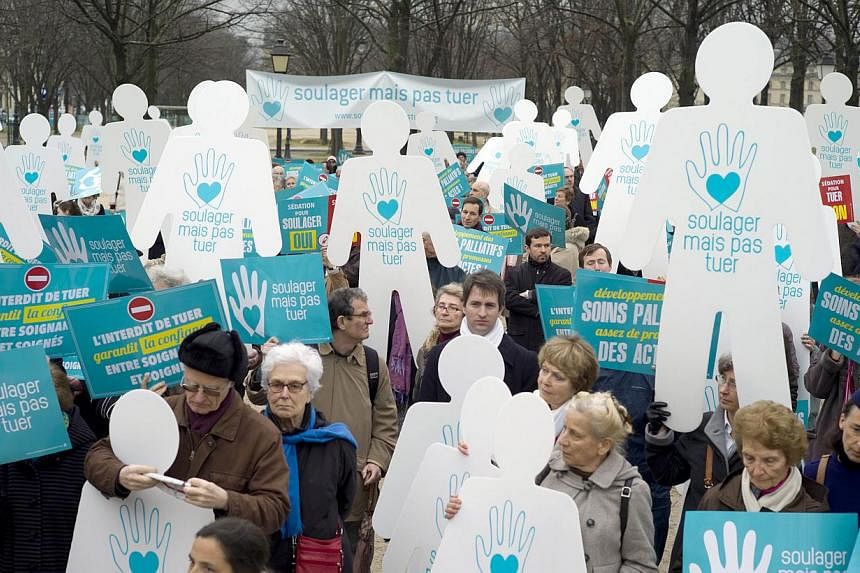The last time the French Parliament voted on medical care for the terminally ill, the Bill was carried unanimously. Ten years later, a debate on a new law to authorise "deep sedation" until death is far less consensual.
Both the 2005 law and the new Bill debated this week were presented by the same member of the National Assembly, France's lower house, Mr Jean Leonetti, a member of the opposition Union for a Popular Movement.
This time, reflecting the campaign promise of President Francois Hollande before his 2012 election to ease the suffering of the dying, the conservative Mr Leonetti was joined by a Socialist deputy, Mr Alain Claeys, as the law's co-author.
The debate opened on Tuesday with a vote expected next week.
The new Bill stops short of advocating outright euthanasia or "assisted suicide", as allowed in neighbouring Belgium and the Netherlands. Some opponents argue that it is hypocritical, using a form of words to cover up a means of putting patients to death. Others say the law does not go far enough and requires a more explicit terminology giving patients the right to be helped to die.
A poll of 1,005 people in December found that 55 per cent of the French people want better palliative care, while 47 per cent said they would not agree to euthanasia for themselves.
Small groups of demonstrators gathered outside the National Assembly with posters advocating both positions - either calling for a stronger law giving patients clear rights to assisted suicide or condemning a cover-up of de facto euthanasia.
Inside, Prime Minister Manuel Valls said the Bill merely aimed to bestow "the right to die peacefully, in dignity and without suffering". But some speakers said "deep sedation" amounted to administration of anaesthetics that could keep the dying in a vegetative state for weeks.
Speakers on both the right and left were divided. A Communist member appealed for the Bill to be abandoned and the original 2005 law to be applied better. One said that 20,000 hospital places promised for the terminally ill a decade ago had still not been provided. Others advocated unequivocal euthanasia.
France's state health service was once described by the World Health Organisation as the world's best. But the area where it is considered most lacking is palliative care, with doctors often accused of "therapeutic obstinacy" in keeping the terminally sick alive, often in distressing and painful conditions.
Since the 2005 law was adopted, allowing conscious patients to opt for an end to treatment, hospital doctors have increasingly been willing, in consultation with families, to cut off life support.
Writing in the daily Le Monde, five leaders of France's Christian, Jewish and Muslim faiths said nothing could justify putting a patient to death, "neither health, loss of consciousness, extreme vulnerability nor even a desire to die".
While it might sometimes be "useful or necessary to put a patient to sleep, in exceptional circumstances, the use of this technique is denatured when it is used no longer just to comfort a patient but to provoke his death", said the five, including the Catholic archbishop of Lyons, the Grand Rabbi and the president of the Union of French Mosques.
The issue of Le Monde that carried the religious leaders' appeal also reported on the last days of French cancer victim Fabienne Bidaux, 48, who was interviewed before she left for Switzerland to die in the Dignitas clinic near Zurich at a total cost of €8,400 (S$12,500). After drinking a lethal potion, she died on Feb 16, "serene, at peace and smiling", according to a friend quoted by the paper.
The parliamentary debate opened two months after the case of Mr Vincent Lambert, now 38, went before the European Court of Human Rights in Strasbourg, which is reviewing a decision by the French Council of State to allow his hospital to end life support. Mr Lambert, a psychiatric nurse, has been in a coma since a road accident in 2008.
While his wife and five siblings sought permission for him to be allowed to die, his parents appealed, saying their son was "handicapped, but not at the end of his life". The European court held its hearing on Jan 7 but has not yet given its ruling.

